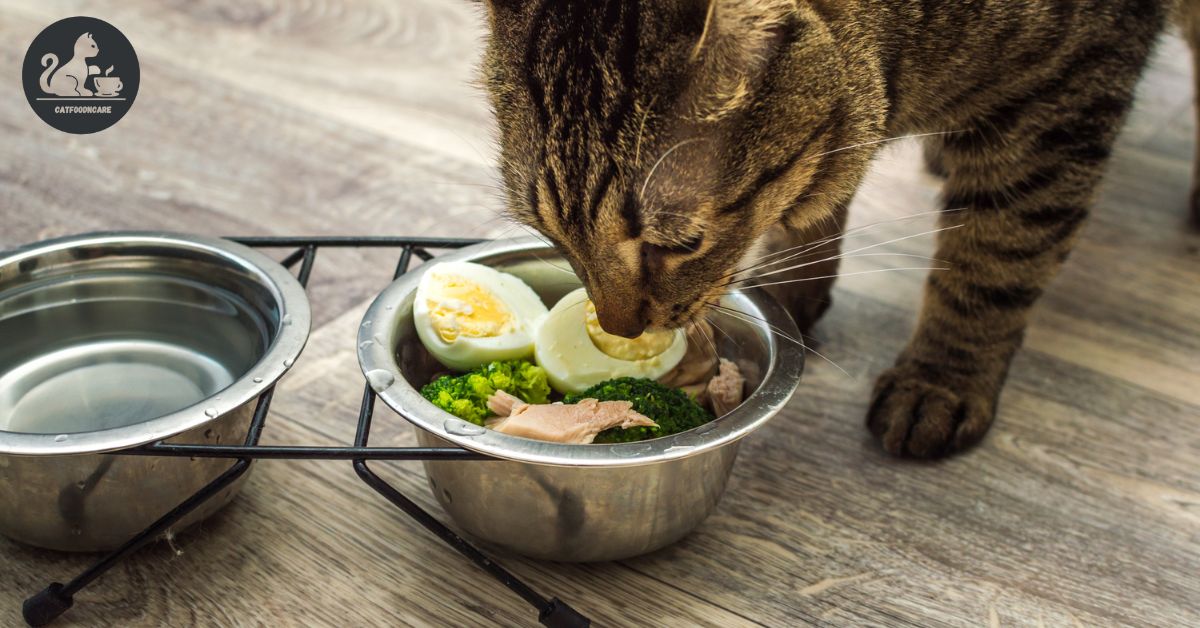Cats are known for their finicky eating habits, but have you ever wondered if your feline friend can enjoy some human food like scrambled eggs? Scrambled eggs are a great source of protein for humans, but can they be a healthy treat for cats too? The answer is yes, cats can eat scrambled eggs. However, it’s important to note that while eggs can be an excellent source of protein and other essential nutrients for cats, they should not replace a balanced diet of high-quality cat food.
Eggs are rich in amino acids and fatty acids that can help maintain healthy skin and a shiny coat in cats. They also contain vitamin B2 and other nutrients that are beneficial for cats. However, eggs should only be given as an occasional treat and not as a primary food source. Too many eggs can lead to weight gain and other health issues in cats.
It’s also important to remember that while cats can eat scrambled eggs, raw egg whites can be harmful to them. Raw egg whites contain a protein called avidin that can interfere with the absorption of biotin, a type of vitamin B, in cats. This can lead to biotin deficiency, which can cause skin and coat problems in cats. Therefore, it’s best to cook the eggs thoroughly before giving them to your cat to eliminate any harmful bacteria and avidin.
While scrambled eggs can be a healthy treat for cats, they should be given in moderation and as part of a balanced diet.
What Do Veterinarians Say about Feeding Scrambled Eggs to Cats?
Veterinarians generally agree that cats can eat scrambled eggs as an occasional treat. Eggs are an excellent source of animal protein, which is crucial for your feline friends. They contain essential amino acids that help maintain lean muscle and promote healthy skin and a shiny coat. However, eggs should not be the sole source of protein in your cat’s diet. Commercial cat foods are specially formulated to provide a balanced diet, meeting all the nutritional needs of cats.

While egg yolks are a good source of protein and fatty acids, raw egg whites contain a protein called avidin that can interfere with the absorption of biotin, a type of vitamin B. Cooking the eggs can neutralize this protein, making it safe for cats to eat. However, be careful with the fat content and calorie intake. Too many eggs can lead to weight gain and health conditions such as kidney disease.
Also, avoid feeding raw eggs to cats due to the risk of harmful bacteria like E. coli and Salmonella. These bacteria can cause food poisoning, leading to gastrointestinal issues.
While eggs can provide health benefits, they should be given in moderation and should not replace regular diets. Always consult with a veterinarian before making significant changes to your cat’s diet.
Can Cats Eat Scrambled Eggs?
Yes, cats can eat scrambled eggs. Scrambled eggs can be a healthy treat for our feline friends. They are an excellent source of protein, which is essential for the growth and maintenance of lean muscle in cats. Eggs also contain essential amino acids and fatty acids that contribute to healthy skin and a shiny coat.
However, it’s important to remember that while eggs are a good source of protein, they should not be the sole source of protein in your cat’s diet. Cats require a balanced diet that includes a variety of animal proteins. Commercial cat foods are designed to provide this balance.
Eggs should be cooked thoroughly to kill any harmful bacteria like Salmonella or E. Coli that could be present in raw eggs. Avoid adding any additional ingredients like salt or milk to the eggs, as these can be harmful to cats.
Eggs should be served to cats in moderation due to their high fat content and calorie count. Too many eggs could lead to weight gain and other health issues. As a rule of thumb, eggs should make up no more than 10% of your cat’s daily calories.
Some cats may have an egg allergy, so it’s important to introduce eggs into their diet slowly and watch for any signs of food allergies such as itchy skin or excessive grooming.
While scrambled eggs can be a healthy treat for cats, they should not replace a balanced diet of high-quality cat food. Always consult with a vet or cat nutrition expert before making any major changes to your cat’s diet.
Nutritional Benefits of Scrambled Eggs for Cats?
Scrambled eggs can be a healthy treat for our feline friends. Here are some nutritional benefits of scrambled eggs for cats:
- Eggs are an excellent source of protein. Animal protein is essential for cats, and eggs provide a high-quality source. This protein helps build lean muscle and keep their skin and coat healthy.
- Egg yolks are rich in essential amino acids. These are the building blocks of protein that cats need for good health.
- Eggs contain healthy fats. The fat content in eggs contributes to a shiny coat and healthy skin in cats.
- Eggs are a source of Vitamin B2 and other complex B vitamins. These vitamins are important for adrenal gland health and brain health.
- Eggs provide Omega-3 fatty acids. These fatty acids are beneficial for heart health and can help reduce inflammation.
However, it’s important to remember that eggs should only be an occasional treat for cats. They should not replace a balanced diet of high-quality cat food. Too many eggs can lead to weight gain and other health issues. Also, raw egg whites can contain harmful bacteria like E. Coli and Salmonella, so it’s safer to cook the eggs thoroughly before giving them to your cat.
Potential Health Risks of Feeding Scrambled Eggs to Cats?
- Feeding scrambled eggs to cats can pose potential health risks.
- Egg yolks are high in fat content, which can lead to obesity and other health conditions if fed in large amounts.
- Raw egg whites contain a protein called avidin that can interfere with the absorption of biotin, a type of vitamin B. This can lead to skin and coat problems.
- Eggs are a source of protein, but they should not be the sole source of protein for your feline friends. Cats require a balanced diet with a variety of animal proteins.
- Overfeeding eggs can lead to an increase in calorie intake, resulting in unwanted weight gain.
- There’s a risk of food poisoning from harmful bacteria like Salmonella and E. Coli if the eggs are not cooked properly.
- Some cats may have an egg allergy. Signs of food allergies can include itchy skin, excessive grooming, and ear infections.
- Eggs should be an occasional treat, not a regular part of their diet. Too many eggs can disrupt their normal diets and lead to health issues.
- Feeding raw food like eggs can also put your cat at risk for bacterial diseases like E. Coli infections.
- Lastly, the high cholesterol content in eggs could potentially lead to cardiac disease in cats.
How to Feed Scrambled Eggs to Cats Safely?
Feeding scrambled eggs to your feline friends can be a healthy treat when done correctly. Eggs are an excellent source of protein, which is essential for the growth and maintenance of lean muscle in cats. However, it’s important to remember that eggs should not be the sole source of food for cats, but rather an occasional treat to supplement their regular diets.
Here are some steps to safely feed scrambled eggs to cats:
Step 1: Choose the Right Eggs
Always select fresh eggs for your cats. Avoid feeding them eggs that are past their expiration date as they may contain harmful bacteria like Salmonella or E. Coli, which can cause food poisoning in cats.
Step 2: Cook the Eggs Thoroughly
Raw egg whites contain a protein called avidin that can interfere with the absorption of biotin, a type of vitamin B, in cats. Therefore, it’s important to fully cook the eggs to deactivate this protein. Also, cooking eggs kills any potential harmful bacteria.
Step 3: Avoid Adding Extra Ingredients
When preparing scrambled eggs for your cats, avoid adding additional ingredients like salt, pepper, or butter. These can be harmful to cats and lead to health issues. Also, some cats may have a food allergy to certain additives.
Step 4: Serve the Eggs in Small Portions
Cats have a smaller calorie intake requirement than humans. A large portion of eggs can lead to unwanted weight gain and other health conditions in cats. As a rule of thumb, a tablespoon of egg whites or a bit of yolk can be a sufficient portion for most adult cats.
Step 5: Monitor Your Cat’s Reaction
After feeding eggs to your cat for the first time, watch for any signs of food allergies, such as excessive grooming, itchy skin, or ear infections. If you notice any of these symptoms, stop feeding eggs to your cat and consult a vet.
Step 6: Store Leftover Eggs Properly
If there are leftover scrambled eggs, store them in an airtight container in the refrigerator. They can be kept for up to two days.
Remember, while eggs are a source of protein and other essential nutrients, they should not replace a balanced diet of high-quality cat food. Always consult with a vet or a cat nutrition expert before making any significant changes to your cat’s diet.
Conclusion
In wrapping up, cats can eat scrambled eggs as an occasional treat. Eggs are an excellent source of protein and provide many nutritional benefits for our feline friends. However, it’s important to remember that eggs should not replace a balanced diet of high-quality cat food. Egg yolks can be a healthy treat, but raw egg whites should be avoided due to the risk of harmful bacteria. Always cook eggs thoroughly and serve in small portion sizes to avoid weight gain and other health conditions. Lastly, be mindful of potential egg allergy in cats, and always consult with a vet if you notice any signs of food allergies.
Recent Posts
10 Best Canned Cat Foods of 2024, According to Veterinarians
Inside this expert-backed list of 2024's top wet cat foods, discover why veterinarians trust these brands for optimal feline nutrition.
Grab expert insights into the top-rated wet cat foods that veterinarians trust most, and discover why some brands outshine...

